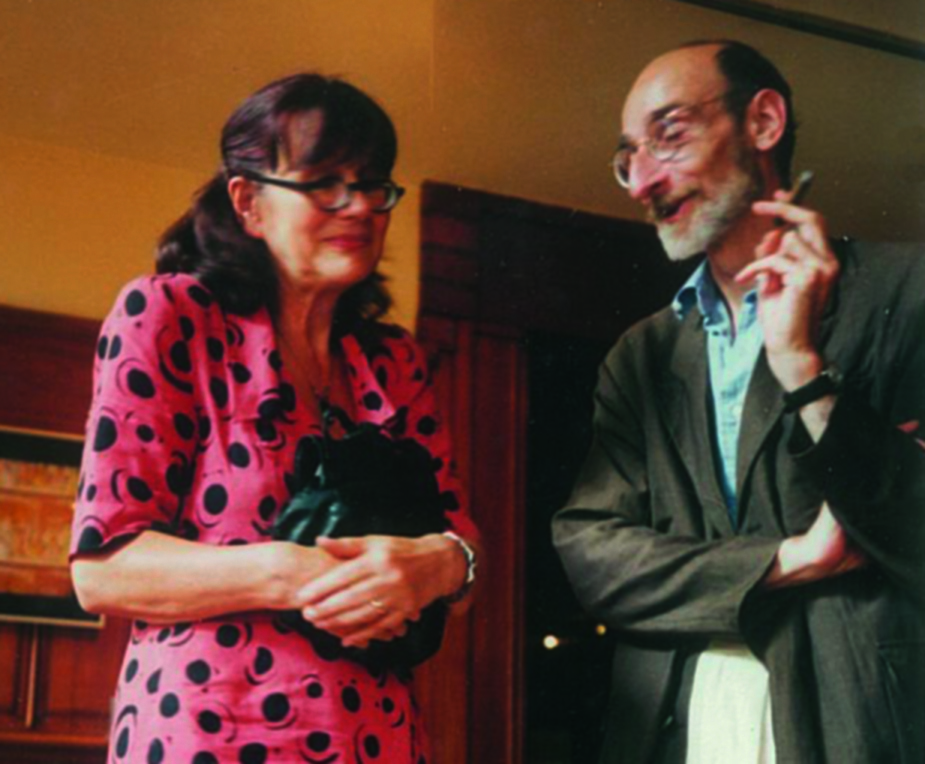For Frieda
At the table, at the restaurant. Frieda and Enno, side by side. Exchanging menus. One short-sighted, the other long-sighted. Or the other way round. The menu ten centimetres away from the eyes, passed on and then deciphered one metre from the eyes. Whispering to one another. And back to the menu of one, of the other.
They exchange glances, Frieda and Enno. Cinephilic glances too. One, historical and objectifying. The other, aesthetic and personal. Their paths often cross.
In Enno’s presence, we spoke German. But between us, between Frieda and me, it was French.
The French language is what bound us. In our conversations – not frequent enough, alas – and in our more intimate and frequent correspondence. As Frieda confided to me: “As soon as the mail arrives, I recognise the sender by the cigar smell...”
From her holidays in France she brought back Roger et Gallet soaps – quite common in France but, according to her, unobtainable in Germany.
What touching frivolity. A somewhat stiff, restrained kind of frivolity... but real nonetheless. Rooted in sovereign intelligence. Who wrote better about Lubitsch than Frieda? A sharp and to me slightly (slightly!) hermetic mind. Those transitions from one paragraph to another. A sudden and unexpected twist in her mind, which strikes me as a moment of mystery, perhaps refusal? A short circuit of the mind, no doubt. Why these mental leaps?
The silences in her texts are precious. They interrogate me.
In fact, cinema was not often the subject of our conversations. As if it went without saying not to broach this topic. Cinema was part of the air we both breathed. Strangely enough, literature occupied us more.
Frieda made me read Theodor Fontane. She also loved my books. I would have liked her to translate them into German.
What kept her from doing so – and what kept me from insisting? – was the seriousness, the obstinacy she put into writing her own texts. This labour, which she claimed to be real labour, could only be relieved, supported, coped with in a context that was quite contrary to reflection and writing: the kitchen. Writing about Ophüls or Ozu on a corner of the kitchen table... surrounded by the smell of everyday life. Cooking, “making food” – thus protecting herself from the torment of writing. An attitude that is difficult for me to understand, my own approach to writing being quite different. (The same goes for my approach of cooking.) It remains a mystery to me that these beautiful texts originated between simmering boeuf bourguignon and caramel flan, still to be prepared.
Through her texts – her prodigious short remarks on films, known as the “Filmtips” – I discovered the Süddeutsche Zeitung, to which I have remained faithful for so many decades. It is not said enough and it is too often forgotten: the part of the writing process that is played by the demand side, which we too easily reduce to the editor. For a daily newspaper to trust a film critic like Frieda takes courage and flair. In fact, it is a matter of mutual trust. Feeling supported by a daily newspaper is reassuring and stimulating. “So I don’t just write for my colleagues and fellow film lovers. My voice, however thin, will carry beyond that.”
That legitimacy issue is not an issue among colleagues, for example at Filmkritik. Or even at Die Zeit. But to gain the absolute confidence of a daily newspaper is of a different order.

Originally published as “Pour Frieda”, in: Ungenierte Unterhaltung. Mit Frieda Grafe im Grandhotel, Hrsg. von Karola Gramann, Ute Holl und Heide Schlüpmann (Wien: SYNEMA-Publikationen, 2022), 45-46.
With thanks to Eric de Kuyper and Heide Schlüpmann.

